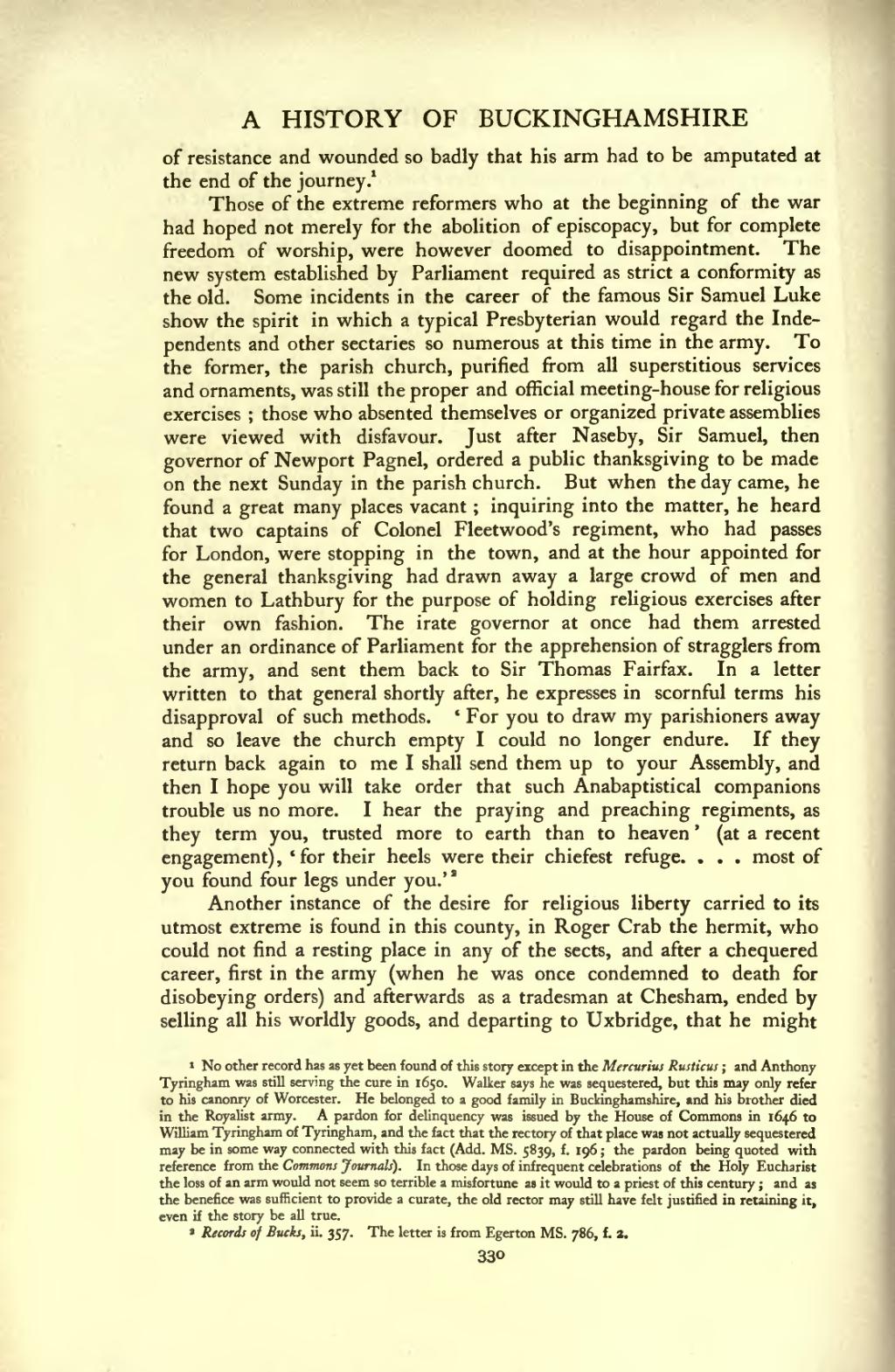of resistance and wounded so badly that his arm had to be amputated at the end of the journey. [1]
Those of the extreme reformers who at the beginning of the war had hoped not merely for the abolition of episcopacy, but for complete freedom of worship, were however doomed to disappointment. The new system established by Parliament required as strict a conformity as the old. Some incidents in the career of the famous Sir Samuel Luke show the spirit in which a typical Presbyterian would regard the Inde- pendents and other sectaries so numerous at this time in the army. To the former, the parish church, purified from all superstitious services and ornaments, was still the proper and official meeting-house for religious exercises ; those who absented themselves or organized private assemblies were viewed with disfavour. Just after Naseby, Sir Samuel, then governor of Newport Pagnel, ordered a public thanksgiving to be made on the next Sunday in the parish church. But when the day came, he found a great many places vacant ; inquiring into the matter, he heard that two captains of Colonel Fleetwood's regiment, who had passes for London, were stopping in the town, and at the hour appointed for the general thanksgiving had drawn away a large crowd of men and women to Lathbury for the purpose of holding religious exercises after their own fashion. The irate governor at once had them arrested under an ordinance of Parliament for the apprehension of stragglers from the army, and sent them back to Sir Thomas Fairfax. In a letter written to that general shortly after, he expresses in scornful terms his disapproval of such methods. ' For you to draw my parishioners away and so leave the church empty I could no longer endure. If they return back again to me I shall send them up to your Assembly, and then I hope you will take order that such Anabaptistical companions trouble us no more. I hear the praying and preaching regiments, as they term you, trusted more to earth than to heaven ' (at a recent engagement), 'for their heels were their chiefest refuge. . . . most of you found four legs under you.' [2]
Another instance of the desire for religious liberty carried to its utmost extreme is found in this county, in Roger Crab the hermit, who could not find a resting place in any of the sects, and after a chequered career, first in the army (when he was once condemned to death for disobeying orders) and afterwards as a tradesman at Chesham, ended by selling all his worldly goods, and departing to Uxbridge, that he might
- ↑ No other record has as yet been found of this story except in the Mercurius Rusticus ; and Anthony Tyringham was still serving the cure in 1650. Walker says he was sequestered, but this may only refer to his canonry of Worcester. He belonged to a good family in Buckinghamshire, and his brother died in the Royalist army. A pardon for delinquency was issued by the House of Commons in 1646 to William Tyringham of Tyringham, and the fact that the rectory of that place was not actually sequestered may be in some way connected with this fact (Add. MS. 5839, f. 196 ; the pardon being quoted with reference from the Commons Journals). In those days of infrequent celebrations of the Holy Eucharist the loss of an arm would not seem so terrible a misfortune as it would to a priest of this century ; and as the benefice was sufficient to provide a curate, the old rector may still have felt justified in retaining it, even if the story be all true.
- ↑ Records of Bucks, ii. 357. The letter is from Egerton MS. 786, f. 2.
